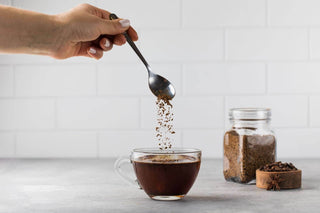Key Takeaways
- Decaf coffee has a decreased amount of caffeine, extracted when the beans are still green to preserve the aroma and flavor.
- The extraction typically happens through one of the four methods - direct method with chemical solvent, indirect method with chemical solvent, water method or CO2 method.
- Decaffeinated coffee is typically deemed the healthier option, as less caffeine helps minimize the negative effects associated with caffeine.
- Among decaffeinated coffee benefits you can find decreased caffeine content, safer for pregnant women, contains antioxidants, less pronounced effects of GI issues, and more.
What Are the Benefits of Drinking Decaf Coffee?
It’s no secret that coffee has several health benefits, with more being discovered thanks to more human studies being conducted. But did you know that it’s also the case for decaf coffee? There are actually several instances where decaf coffee has an advantage over regular one, even if it’s small. There are also some that both of these types of beverages share.
What are they? We mention some of the decaf coffee benefits below.
Contains Little Caffeine
Many people believe that decaf coffee doesn’t contain any caffeine. However, that’s not the case. The amount of caffeine in decaf coffee is definitely significantly reduced, but it is not non-present. Typically, you’ll find up to 7 mg of caffeine per cup of decaf coffee. Regular coffee, on the other hand, has anywhere between 70 and 140 mg of caffeine per cup. Quite a difference, wouldn’t you agree?
Still, since caffeine content is drastically lower, decaf coffee does not have the same energizing effect many know and love regular coffee for. It’s a perfect choice for anyone looking for a way to enjoy a cup of joe in the evening without worrying if it’ll make them stay up all night and affect their sleeping routine.
If you’re sensitive to caffeine, and especially if regular coffee tends to exacerbate your anxiety or stress but you don’t want to give up coffee completely, it might be worth giving decaf coffee a shot.
Can Be Drank During Pregnancy (In Moderate Amounts)

Contains Antioxidants
Additionally, the compounds are also said to be helpful with cognitive skills, improving performance and alertness - one study was even made in this regard, but the results showed no real connection between cognitive performance and decaf coffee. As it was noted in the conclusion, however, more large-scale, perspective studies regarding this matter are needed.
Can Potentially Lower the Risk of GI Issues
Increases Blood Pressure Less than Regular Coffee
Is Decaf Coffee Healthier than Regular Coffee?
But, is decaf coffee healthier than regular coffee?
It is certainly perceived that way due to the decreased caffeine content, which lowers or even eliminates the chances of experiencing the negative effects of caffeine while leaving behind the positive effects, such as those caused by the presence of antioxidants.
How Is Decaf Coffee Made

- Direct method with chemical solvents - With this method, you first steam the beans and then soak them in a chemical solvent. The solvent bids to the caffeine, extracting it from the beans.
- Indirect method with chemical solvents - Just like direct method, this one also uses a chemical solvent - however, the beans and the chemicals do not make direct contact. First, you soak your beans in hot water for several hours. Then, the water gets treated with a chemical solvent that will extract caffeine from it. The same water is used to return the coffee flavor to the beans, while the final step gets rid of any solvent traces.
- Water method - Also known as the Swiss water process, this decaffeination method is very much similar to the indirect method - but instead of chemical solvent, you pass the coffee beans through activated charcoal filters.
- CO2 method - Here, you place your coffee beans in a high-pressure chamber filled with liquid CO2, which binds to them and removes the caffeine, leaving decaffeinated beans behind.
Benefits of Decaf Coffee - The Bottom Line
Decaf coffee has a number of health benefits that it shares with regular coffee, but also some that are unique to it. For example, it is generally considered to be the safer option for pregnant women who don’t want to give up coffee completely, and it is also deemed as healthier compared to regular coffee due to the decreased caffeine intake. If you want to enjoy the taste of coffee in the evening without it keeping you awake for half the night, decaf coffee should be your way to go.
At Angelino’s, we believe that decaffeinated coffee doesn’t have to be boring - that’s why we have a number of decaf coffee pods for you to choose from, both classic and flavored ones. And if you take a look at our blog section, we have a number of coffee recipes you are bound to enjoy and in which regular coffee can be replaced by decaf coffee.
Take a look at The Best Coffee Cocktails for Summer Parties or our favorite Espresso Martini recipe, among others, and find something for yourself!



